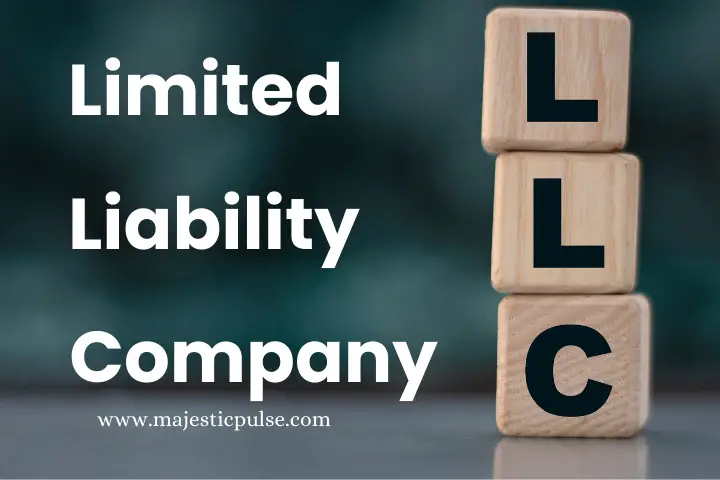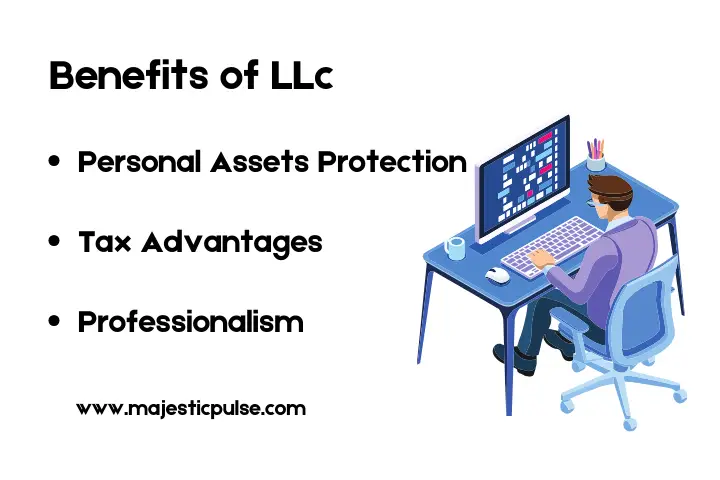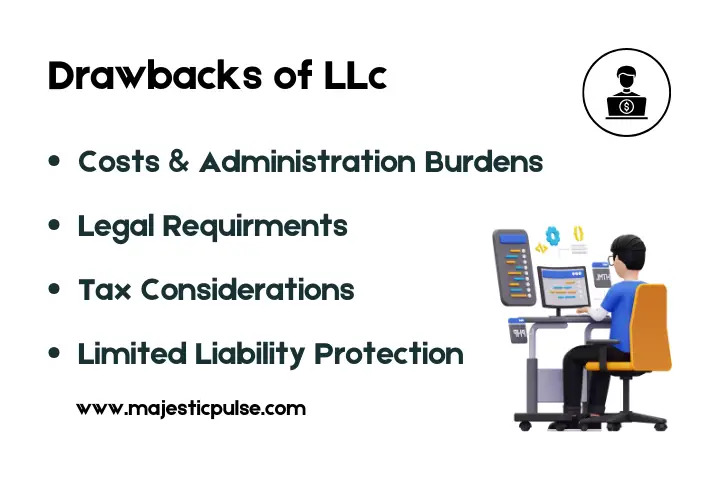Do I need an LLC to freelance? This question has become very common now a day for different freelancers. Freelancing has become increasingly popular in recent years, offering individuals the flexibility and autonomy to work on their own terms. As freelancers move forward in the world of self-employment, different questions about their business structure arise. One common consideration is how to form a Limited Liability Company (LLC). An LLC is a business structure that combines the flexibility and tax benefits of a partnership with the limited liability protection of a corporation. Many freelancers think, ” Do I need an LLC to do freelance work?” While not a requirement, forming an LLC can provide freelancers with added protection and professionalism. Let’s explore the factors to consider: “Do I need an LLC to be a freelancer?”
Table of Contents
ToggleWhat is an LLC?

An LLC, or Limited Liability Company, is a business structure that combines the process of taxation of a partnership or sole proprietorship with the limited liability protection of a corporation. This means that the owners of an LLC, known as members, are not personally liable for the company’s debts or liabilities.
One of the key benefits of forming an LLC is personal asset protection. In the case that the LLC faces legal action or debt, the personal assets of the members, such as their homes or savings, are typically protected. Additionally, LLCs offer flexibility in terms of management and taxation. Members can choose to be taxed as a sole proprietorship, partnership, S corporation, or C corporation, depending on their preferences and business needs.
Compared to sole proprietorships and partnerships, LLCs offer more credibility and professionalism, as they are registered entities with the state. This can be beneficial when dealing with clients or entering into contracts, as it provides a sense of legitimacy to your freelance business. Overall, forming an LLC can be a smart choice for freelancers looking to protect their personal assets and establish a more formal business structure.
Does a freelancer need an LLC?
It is a common question in the mind of freelancers “Does a freelancer need an LLC?” Let’s answer this. An LLC is not a compulsion for freelancers. They are not legally required to form an LLC because there are alternative business structures available that allow them to operate legally and more efficiently. Here’s why freelancers may choose not to form an LLC:
Simplicity and Flexibility
Operating as a sole proprietorship or independent contractor requires minimal paperwork and administrative overhead compared to forming an LLC. Freelancers may prefer this simplicity, especially when starting out or working on smaller projects.
Lower Costs
Forming and maintaining an LLC involves certain costs, including filing fees, legal fees for drafting operating agreements, and ongoing compliance requirements. Freelancers may avoid these costs, particularly if their business is small-scale or if they’re working on short-term projects.
Tax Considerations
While an LLC offers potential tax advantages, such as the option for pass-through taxation, freelancers may find that their tax situation is manageable without forming an LLC. They can still deduct business expenses and report income on their personal tax returns as self-employed individuals.
Risk Assessment
Freelancers who perceive their business risks as relatively low may not see the need for the added protection of an LLC. For example, those working in low-liability fields or with clients who provide contracts and liability protections may feel comfortable operating as sole proprietors.
Business Goals and Growth Plans
Some freelancers may have aspirations for growth and expansion, while others may prefer to keep their businesses small and manageable. The decision to form an LLC often depends on long-term business goals and whether the freelancer anticipates scaling up their operations in the future.
In short, while forming an LLC offers certain advantages, it’s not a one-size-fits-all solution for freelancers. Each freelancer’s situation is unique, and factors such as their risk tolerance, financial considerations, and growth plans play a significant role in determining whether an LLC is necessary for their freelance work.
Benefits of Having an LLC as a Freelancer
You may think, “Do I need an LLC to do freelance work?” let’s answer this question in light of the benefits that an LLC can provide:

Personal Asset Protection
Forming an LLC provides personal asset protection for freelancers. In the case that your business is sued or faces financial liabilities, your personal assets, such as savings accounts, investments, and even your home, are generally protected from being used to pay business debts or legal judgments. This means that creditors typically cannot pursue your personal belongings to settle business obligations, offering a vital safeguard for your financial well-being.
Tax Advantages
One of the significant benefits of operating as an LLC is the potential for tax advantages, particularly through pass-through taxation. With pass-through taxation, the profits and losses of the LLC “pass through” to the individual members’ or owners’ personal tax returns. This means that the LLC itself does not pay taxes at the business level; instead, individuals pay income taxes based on their share of the profits. This structure can result in potential tax savings compared to being taxed at the corporate level, depending on the individual tax situation of the freelancer.
Professionalism
Establishing an LLC can enhance your professional image and credibility with clients. Clients often perceive businesses operating as LLCs as more established, credible, and trustworthy. This perception stems from the formalized structure and legal protections offered by an LLC, which can instill confidence in clients about the freelancer’s commitment to professionalism and ethical business practices. Additionally, having an LLC may open up opportunities to work with larger corporations or secure contracts that require vendors to have a formal business entity.
In short, forming an LLC as a freelancer offers a range of benefits. These benefits not only safeguard your personal finances but also contribute to your credibility in the eyes of clients and provide a solid foundation for long-term success in your freelance journey.
Drawbacks of Having an LLC as a Freelancer
Do I need an LLC to be a freelancer? Yes! You may need an LLC as a freelancer, but having an LLC may result in certain drawbacks:

Costs and Administrative Burden
Forming and maintaining an LLC involves certain costs and administrative responsibilities that freelancers must consider. These expenses may include state filing fees, legal fees for drafting operating agreements, annual renewal fees, and potentially additional costs for tax filings or professional services. Moreover, freelancers operating as LLCs must adhere to regulatory compliance requirements, maintain accurate financial records, and fulfill reporting obligations, which can consume time and resources.
Complexity and Legal Requirements
Operating as an LLC introduces a level of complexity and legal requirements that freelancers may find hectic, particularly if they lack experience or expertise in business law. From navigating state-specific regulations to drafting and adhering to operating agreements, freelancers must contend with various legal nuances and responsibilities. Failure to comply with these legal requirements could result in penalties, fines, or even legal disputes, underscoring the importance of thorough understanding and meticulous adherence to legal obligations.
Tax Considerations and Flexibility
While operating as an LLC offers potential tax advantages, such as pass-through taxation, freelancers may find that their tax situation is not always straightforward. LLC members may face self-employment taxes on their share of the profits, and the tax implications can vary depending on individual circumstances, income levels, and state tax laws. Additionally, some freelancers may prefer the flexibility of other business structures, such as sole proprietorships or partnerships, which offer simpler tax treatment and may better align with their financial goals and preferences.
Limited Liability Protection
While limited liability protection is a significant benefit of forming an LLC, freelancers need to recognize its limitations. While an LLC shields personal assets from business liabilities in most cases, there are situations where this protection may be pierced, such as instances of personal guarantees, commingling of personal and business finances, or fraudulent behavior. Freelancers must take proactive steps to maintain the integrity of their LLC’s limited liability protection and mitigate potential risks to their personal assets.
In summary, while forming an LLC offers freelancers valuable benefits, it also entails drawbacks. Freelancers should carefully weigh these factors and consider consulting with legal and financial professionals to determine whether forming an LLC aligns with their business objectives and circumstances.
How to Form an LLC
Does a freelancer need an LLC? The answer is “it depends upon your business priorities and specifications. Forming a Limited Liability Company (LLC) involves several key steps to establish your business entity legally and officially. While the process may vary slightly depending on the state where you’re forming the LLC, the following is a general overview of the steps involved:
Choose a Name
Select a unique and distinguishable name for your LLC that complies with state laws and regulations. Ensure that the chosen name is not already in use by another business in your state and that it meets any specific naming requirements outlined by state authorities.
File Articles of Organization
Prepare and file the Articles of Organization with the appropriate state agency, typically the Secretary of State’s office or the Department of State. The Articles of Organization document typically includes essential information about your LLC, such as its name, address, registered agent, members, and purpose.
Hire a Registered Agent
Appoint a registered agent for your LLC who will serve as the official point of contact for legal and administrative correspondence on behalf of the company. The registered agent must have a physical address within the state where the LLC is formed and be available during regular business hours.
Create an Operating Agreement
Draft an operating agreement for your LLC, which outlines the internal operating procedures, management structure, member responsibilities, decision-making processes, and other relevant provisions. While some states do not legally require an operating agreement, having one in place is highly recommended to clarify expectations and prevent disputes among members.
Obtain Necessary Permits and Licenses
Research and obtain any required business permits, licenses, or registrations necessary to operate your LLC legally in your state and local jurisdiction. The specific permits and licenses needed may vary depending on the nature of your business activities and industry.
Comply with Ongoing Requirements
Fulfill any ongoing requirements and obligations to maintain your LLC’s good standing, such as filing annual reports, paying annual fees, and renewing business licenses as required by state law. Stay informed about any changes to state regulations or compliance requirements that may affect your LLC.
Consider Professional Assistance
While forming an LLC can be done independently, one should consider seeking professional assistance from legal, financial, or business advisors to ensure compliance with state laws, optimize tax strategies, and address any complex legal or operational issues specific to your business.
Remember that the specific requirements and procedures for forming an LLC may vary depending on the state of your business entity. It’s essential to consult the relevant state authorities or seek professional guidance to navigate the process effectively and ensure compliance with applicable laws and regulations.
Conclusion
So, do you need an LLC to freelance? It’s a question that boils down to what suits you best. Yes, forming an LLC can protect your personal assets. It gives you tax advantages and makes your business look more professional to clients. But it also means dealing with paperwork, costs, and legal stuff that might not be worth it if you’re just starting out or doing small gigs.
Think about what matters most to you. If protecting your personal stuff and looking pro are big deals, an LLC might be worth it. But if you’re okay with the risks and don’t want the hassle, there are other options. Whatever you choose, make sure it fits your goals and feels right for your freelance journey.




















3 Responses
I’m extremely impressed together with your writing skills as well as with the structure to your weblog. Is that this a paid topic or did you modify it your self? Either way keep up the nice high quality writing, it’s rare to look a great blog like this one nowadays..
It’s my own content as i am a freelancer as well.
I’ve been exploring for a little for any high-quality articles or blog posts on this kind of area . Exploring in Yahoo I at last stumbled upon this web site. Reading this info So i’m happy to convey that I’ve a very good uncanny feeling I discovered just what I needed. I most certainly will make certain to do not forget this website and give it a look regularly.